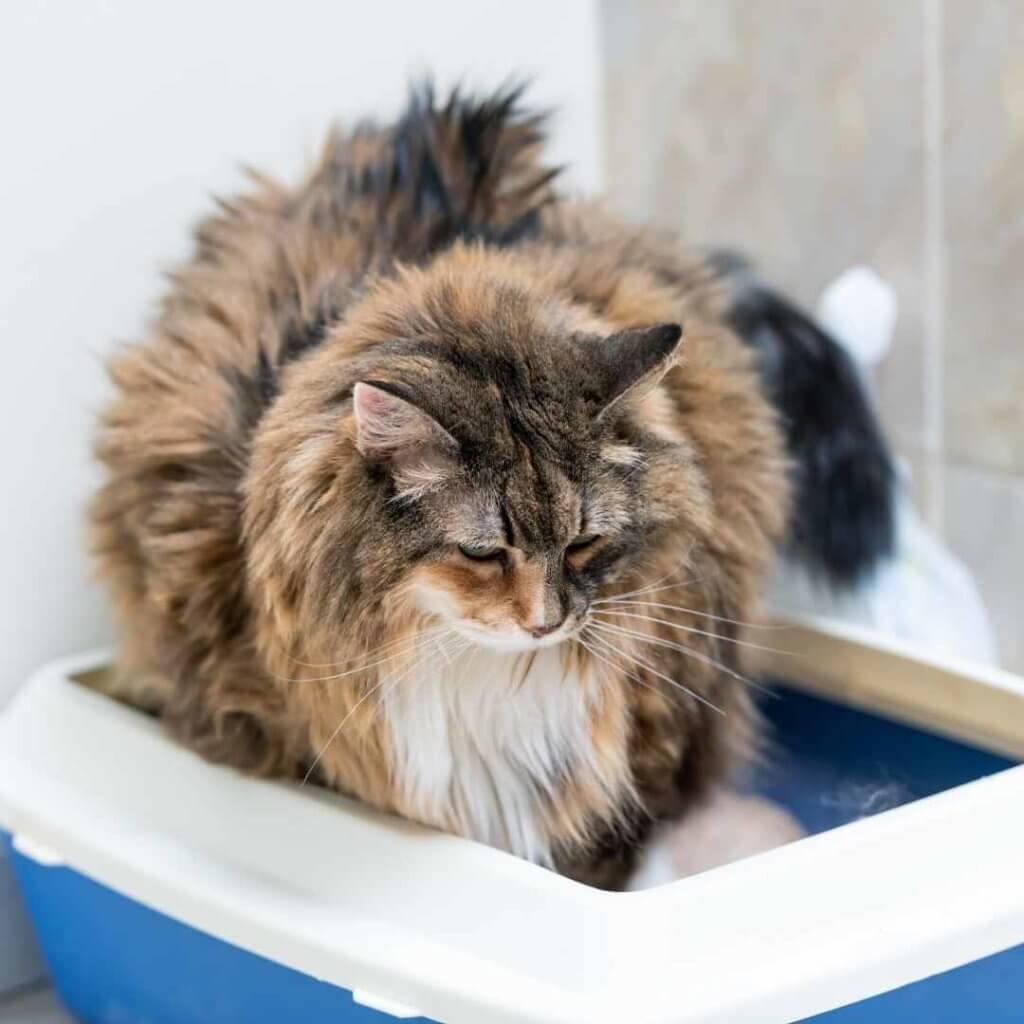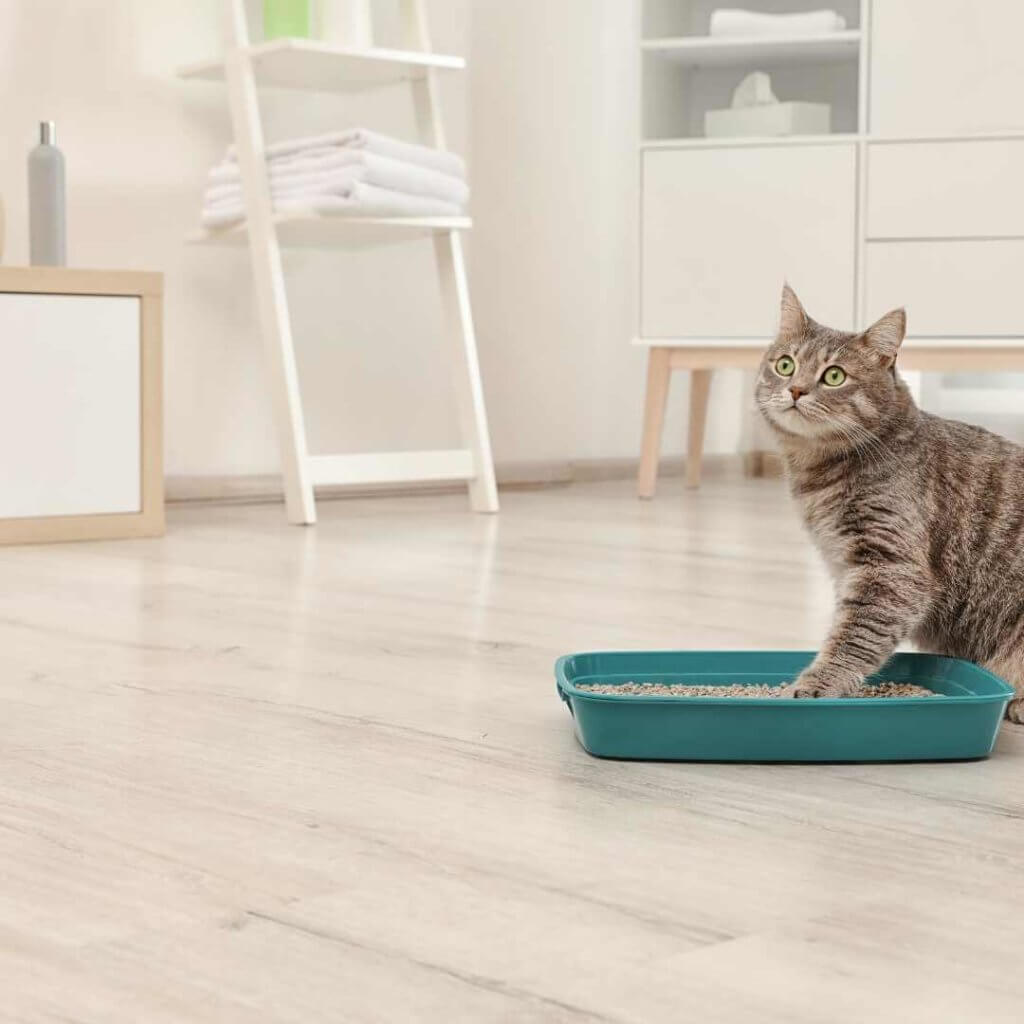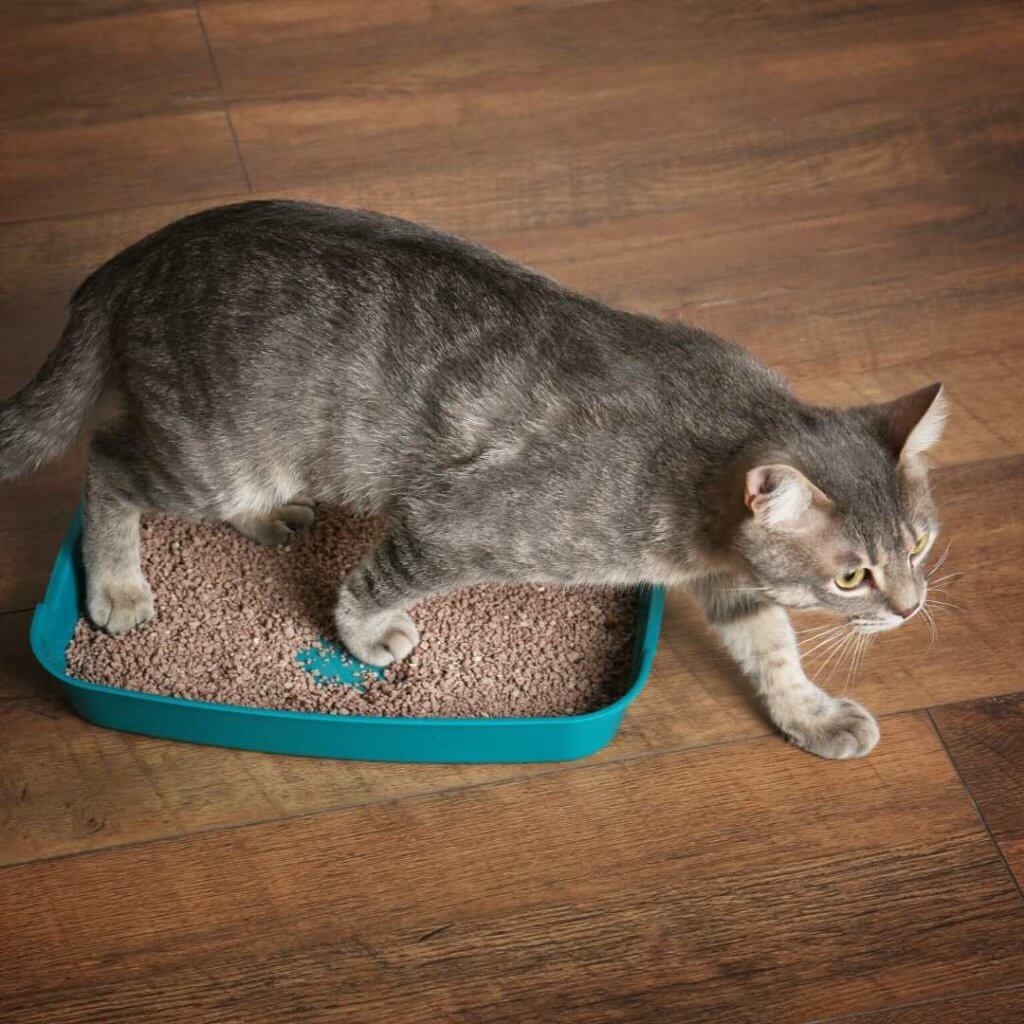Felines are territorial creatures that aren’t fond of sharing things. The same goes for their potty place. If you have several pets, will cats share a litter box or do you have to have more than one?
Most cats can learn to share food bowls and toys. They can play together and drink together. Some will even allow you to pet them with one hand and the other cat with the other. But, they won’t even attempt to use a litter box that other cat frequently uses.
Why is that so? A lot of owners wonder will cats share a litter box if they train them. The truth is, it isn’t that simple. We’ll try to explain why.
Will Cats Share A Litter Box?

If you have more than one pet, will cats share a litter box after some getting used to it? This is entirely individual and up to the cat in question. Many cats will, in fact, gladly share a litter box.
They won’t make a fuss if another feline pees in the same place as they do. Others, however, will hate it. Even if you have two cats that get along very well, they might get into a fight once a litter box is at stake.
This is where they draw the line when it comes to their friendship. There doesn’t necessarily have to be a fight. One of the cats might refuse to use a litter box the other cat has used.
This can cause her to seek alternative methods to get relief. Sadly, going to the bathroom in the wrong places is the number one reason why people return cats to the shelter.
If you notice one of your cats pees where she shouldn’t have, you should first get her to the vet. Sometimes, the cause behind this behavior can be medical, especially if your cats shared a litter box in the past. If the vet rules out any health issues, then your cat simply doesn’t want to share her bathroom. Why do cats do this?
They Need More Space
Cats aren’t pack animals like dogs are. If you own or have owned a dog, you’ll know they love peeing over places other dogs have used. Felines, however, need more space.
Even if they are siblings that came from the same litter, they’ll still want some alone time. Relieving themselves is the most vulnerable daily activity. This is the moment during which they don’t want to be disturbed.
Sharing litter boxes can be extremely stressful for many kitties. In the end, just think about this: Would you be happy if everyone could just get inside your bathroom?
They Are Territorial
Cats are territorial animals due to their natural instinct to protect their space for survival and reproduction. Even in domestic settings, they see their home and owners as their territory.
This behavior is rooted in their wild ancestors who needed to defend their hunting and mating grounds.
Territorial behavior is also influenced by social hierarchy, where dominant cats have access to better resources and territory. This behavior extends to litter boxes, which cats see as their personal space for eliminating waste. [1]
Some cats are more territorial than others. If you have an alpha cat, she will decide that certain parts of the house are their territory. This typically includes her litter box. On such occasions, the alpha cat will be aggressive towards other cats who try to use her things.
She can block the entrance to the litter box, so the other cat won’t be able to use it. This may cause the beta cat to look for another place to empty herself. If you notice your cat pooping outside litter box, chances are the other cat is bullying her.
They Want Their Litter Box Cleaner
Cats are very clean animals and they want their litter box cleaned regularly. If more than one cat uses it, chances are you’re not able to clean it fast enough. In some extreme cases, cat owners may notice bugs in litter box.
Even some bugs may apper in litter box if you are not cleaning it
Not just that, but cats will hate using litter boxes that smell like other cat’s feces. This means the other cat already claimed that bathroom. Because of this, felines will seldom agree to use a litter box that other cat already used.
Cleaning your cat’s litter box is an essential part of cat ownership. Scoop out the waste daily and empty and wash the litter box weekly. Use unscented litter to avoid irritating your cat’s sensitive nose.
Replace the litter box when it shows signs of wear and tear. Keeping the litter box clean will prevent odors and keep your cat healthy. For this reason, it is essential you clean the litter box as often as possible.
[2]
If you don’t have enough time to scoop regularly, use The Litter Robot. This machine uses smart technology to separate clean litter from waste. It will keep the litter box pristine even when you don’t have the time for cleaning.
How Many Litter Boxes You Need?

Once you know will cats share a litter box, you probably wonder what’s the solution when the answer is ‘no.’ If you can’t have one litter box for two cats, what can you do? Get more litter boxes! But how many litter boxes do you really need?
A general rule is to have one litter box for every cat you have, plus one extra, just in case. This is the best way to ensure your household is peaceful and your cats don’t experience any stress.
If you have one cat and have just read that, what does that rule mean for you?
Typically, when you have a smaller house, one litter box is enough for one cat. However, if your property is on a larger size – especially if it has two or more floors – you should reconsider.
You probably wouldn’t like having to go downstairs just to use the bathroom. Your cats should be no different. Get them one litter box per every floor you have.
Where Do You Place the Litter Boxes?

Once you have determined how many litter boxes you need, you should think about their placement. You can’t just stack litter boxes together and hope your cats will use them. Not only will they still smell other cat’s feces, but this can have many other issues, as well.
For example, the bully alpha cat could still prevent the beta cat from getting to her litter box. This is the same as if you would just get one huge litter box and expect your cats to get along.
So, how to get cats to use separate litter boxes? Ideally, you should find the spots your cats are most likely to use. Think about their favorite spots, and put the box nearby. Try finding the place in which it would make sense for a cat to relieve herself.
You probably don’t want this to be in the kitchen, but it also shouldn’t be far away from the cat’s living space. It is also a good idea to keep one litter box in a secluded place, as some cats are shy. They won’t use it if you or other cats are nearby.
Also, some cats prefer one litter substrate over another. If your cat will use neither of the litter boxes, try changing the litter. Find products with different grains, smells, and materials, to see which one your cat likes. Not all of your cats will like the same litter. However, the more choice you give to them, the lower are the chances of an accident happening.
How to Teach Your Cat to Use the Litter Box?

If you have a cat that is already used to doing potty outside of the litter box, don’t panic. You can make her unlearn this bad behavior. The first thing you should do is clean up any area where her urine can be found.
You can do this with:
- An enzymatic pet mess cleaner.
- A 1/1 mixture of vinegar and baking soda, with a few drops of essential oils. You can also add a bit of 3% hydrogen peroxide.
- A 1/1 mixture of rubbing alcohol and vinegar.
Once you have cleaned the room from the cat’s smells, it’s time to make your cat use the new box. It’s a good idea to set up a so-called ‘safe room,’ a place that your cat can feel safe in. This can be a spare bedroom or a bathroom that isn’t regularly used.
Make sure the room has plenty of rugs or covers that you can easily clean if the accidents continue. Other than the litter box, the room should have food and water, a scratching post, and a cat bed. For a while, don’t allow the other, alpha cat, to enter that particular space.
This way, it’ll become a safe haven for the stressed cat. If your cat is okay with staying in a confined space, keep her inside that room for a few days. This is especially important if two cats often get into a fight. Make sure you visit the cat often and check if she used the litter box. If she peed outside of it, clean it right away so the smells don’t linger.
Once you’ve ensured she is used to doing her job in the box, you can open the door. Allow the cats to reintroduce to one another on their own terms. Don’t force them to be friends.
Related: Should I Get A Water Fountain For My Cat
If this doesn’t work, try consulting your veterinarian.
They might suggest some synthetic pheromones that can calm the cat down. Mother cats produce these pheromones to soothe their babies.
For some cats, they are a great calming solution that can make training easier. One of the good such products is Feliway. You can get them from many pet-supply retailers or at the vet’s office. If nothing seems to be helping, contact a behaviorist who can give you some professional advice.
Will cats share a litter box after any of these tactics? Probably not. Some cats will never be okay with sharing their toilets, and that is okay. As long as you have enough litter boxes, you are reducing the chance of accidents.
How to Keep Litter Box Sharing Friendly?

If you are among the lucky owners whose cats share a litter box, there are some rules you should follow.
- Make sure you clean the litter box every day. Nothing will make cats dislike a box such as nasty smells and dirty litter. If you can’t manage this by yourself, consider getting The Litter Robot.
- Consider purchasing a larger box, so your cats have more space.
- Try getting litter that will keep everything odorless.
Failure on at least one of these rules can cause chaos. Your cats might get into a fight, or even stop using that litter box altogether!
Read Also: Can Cats Eat Tofu
Bottom Line
Cats are clean creatures, and dirty things are a no-no for them. Nothing can scream ‘dirty’ as much as the place they relieve themselves in. Will cats share a litter box or will you have to purchase a new litter box for every kitty?
This mostly depends on the temperament and preferences of your furry little friend. While some cats will gladly share their toilet spots, others won’t even consider it.
No matter what the answer is, you should always keep their litter boxes clean. Also, don’t wait for cats to ‘fight it out’ if they don’t want to share. This will only result in a smelly mess. Consult your vet if a cat’s behavior changes suddenly, as this might indicate some health problems.
Read Next: Self Cleaning Litter Box Benefits
